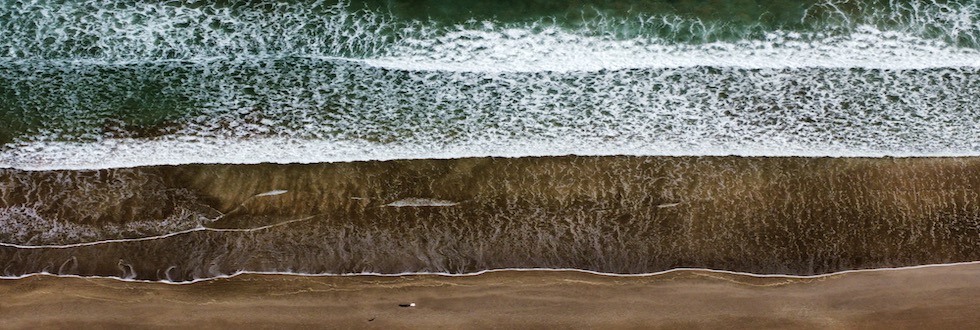NZ First leader Winston Peters' policies include cutting immigration, banning foreign buyers from the housing market, and moving Ports of Auckland. Is that what Auckland needs? Employers and Manufacturers Association chief executive Kim Campbell joins us to discuss how a new government might impact New Zealand's main city.
The word immigration is likely to spark a reaction, depending on which side of the welcoming gate you stand.
On Sunday, Duncan Garner faced a torrent of abuse, including being labelled a racist, following a column calling for New Zealand to curb immigration.
Winston Peters and his party, NZ First, want to cut the number of people coming into the country - with their policy likely to be on the table in coalition negotiations this week.
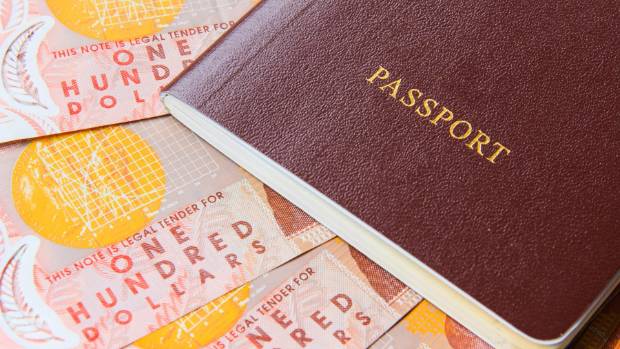
Record migration levels have been praised as a sign of strong economic growth, but there are fears about how the influx of people will put pressure on public services and infrastructure.
And as the attention on immigration fuels fierce debate online, we decided to put some of the common claims made by politicians and social commentators under the microscope.
NEW ZEALAND'S MIGRANT COMMUNITY IS GROWING FASTER THAN EVER

Garner said his column should not be viewed as racist, but definitely "outwardly pro-NZ".
This year's net gain of migrants was 72,000, and New Zealand's population grew by 100,400 to the June 2017 year.
Stats NZ produces population projections ranging from low to high, depending on different rates of fertility, mortality and migration. The medium projection - considered to be the most plausible - is for the population to be 5.5 million by 2038. The 6.3m figure is the 'high' projection and assumes there is high fertility rates, low mortality rates and high net migration. Under the 'low' projection the population would rise to 4.8m by 2038.
New Zealand's population grew at 2.1 per cent in 2016. This is the fastest rate in the past few years, but looking back just to 1960 (which is how far back available data goes) there have been several years in which the rate of growth matched or exceeded that mark. Including 2003 when it was 2 per cent, in 1974 it was 2.1 per cent and in 1962 it was 2.5 per cent. On average, since 1960 the population has grown at 1.16 per cent per year.
New Zealand population projections
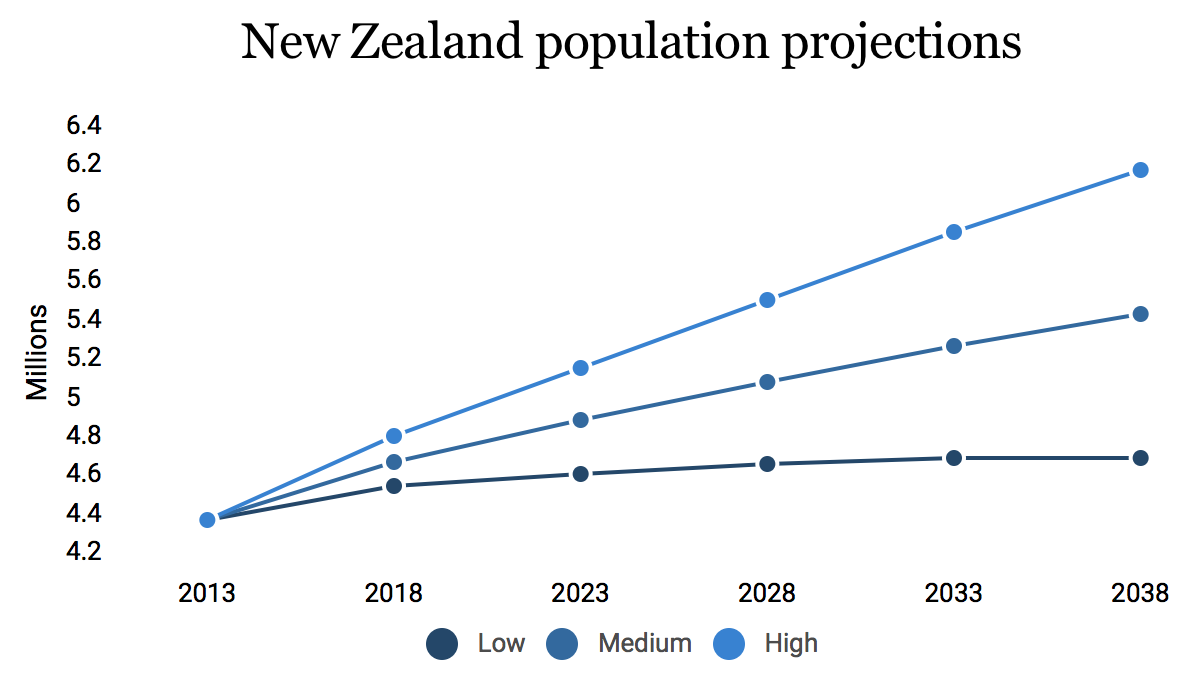
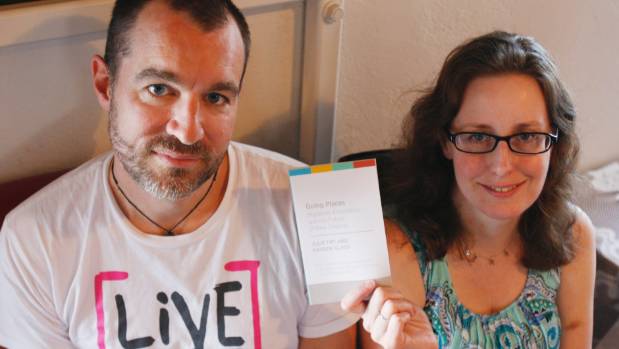
Economist Hayden Glass with his co-author Julie Fry, and their book Going Places.
HOW DOES THAT COMPARE WITH OTHER COUNTRIES?
New Zealand population change (%)
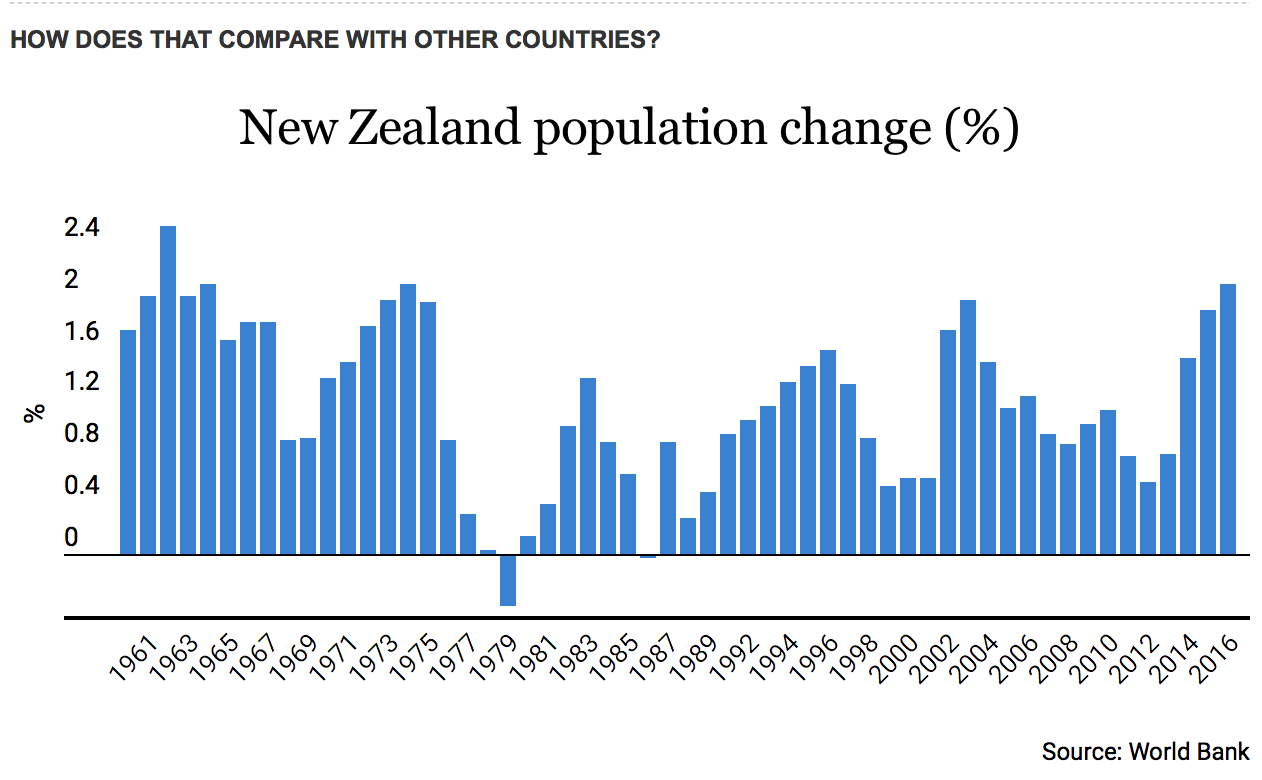
A population growth rate of 2.1 per cent made us the 59th fastest growing country in the world in 2016. Most of the countries with faster rates of growth are in Africa. New Zealand does have the fastest rate of population growth amongst the OECD countries we generally measure ourselves against. Only Ireland (2.04 per cent) comes close.
TOO MANY MIGRANTS CUTS LOCAL WAGES
Not according to Hayden Glass, an economist and co-author of Going Places, a book about the economic contribution of migration to and from New Zealand.
"It's often talked about that immigration has an effect on wages, which makes sense as migrants increase supply," said Glass.
"But when you look at the economic evidence … we found that it does not impact local wages."
How could this be? While they add to the labour supply, migrants also increase the demand, he said.
WHAT IS THE MAKEUP OF OUR MIGRANT POPULATION?
In the year to June 2017, net migration was 72,305. The countries that contributed the most to this figure were China (10,351), India (7409) and the United Kingdom (6728). Followed by South Africa, the Philippines, France and Germany.
"The vast number of visitors to New Zealand are tourists," said Glass.
"The second biggest are temporary workers who are here to do a job, and the third biggest are students. After that it's permanent residents, who are selected effectively on having job or being highly skilled."
A big contributor to the increase in net migration in the past three years has been less Kiwis leaving for overseas and more returning home. For most of this century we lost at 20,000 New Zealand citizens (net), in the past three years that has fallen to the point where arrivals and departures of New Zealand citizens almost cancel each other out.
Glass believes this is the "other piece of puzzle".
Kiwis are coming home and fewer are leaving
Permanent and long-term arrivals and departures of New Zealand citizens
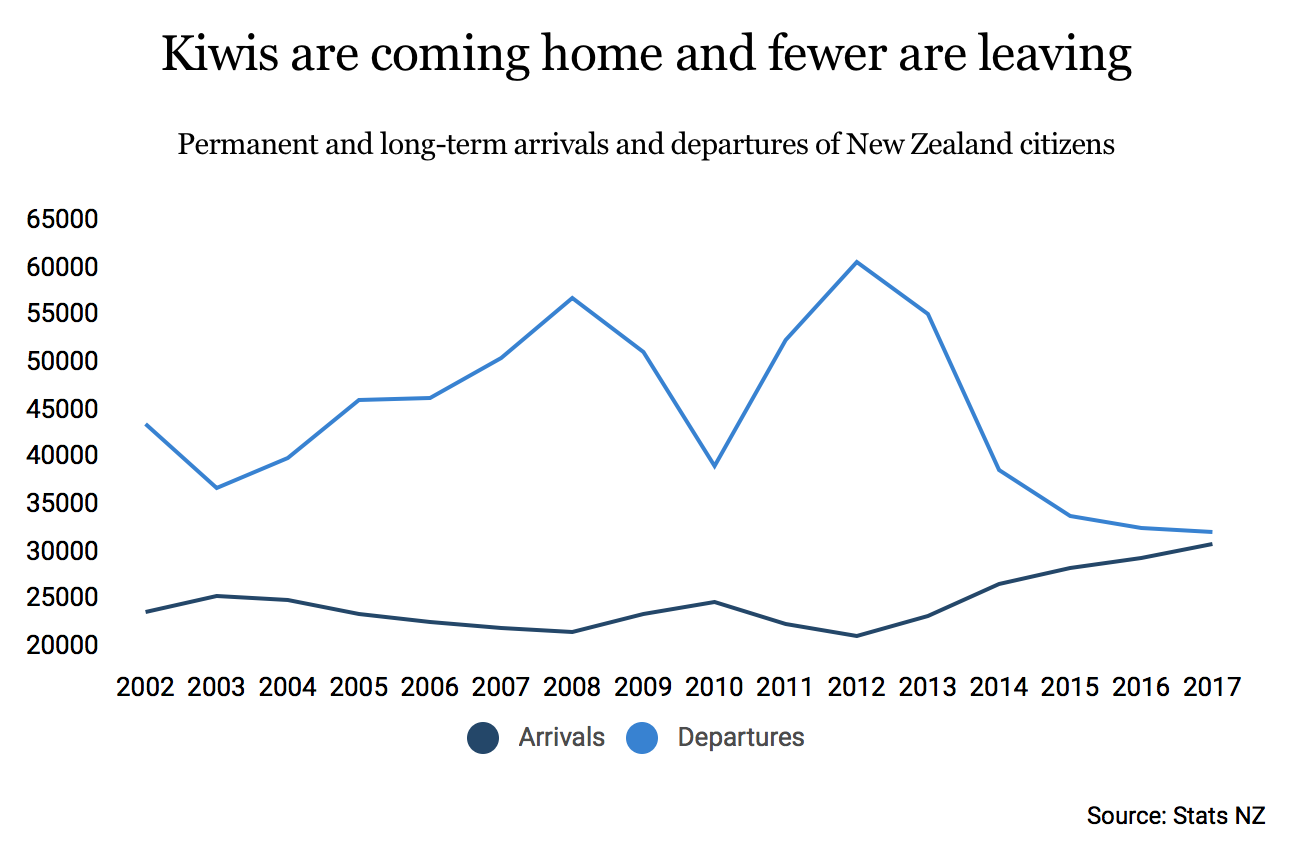
"Departures have been falling since 2012, and with fewer people leaving it's making it hard on immigrants who traditionally filled that gap."
Talking about immigration as a whole is difficult, Glass said, there are a lot of moving parts including different types of visa.
VISA TYPES
Looking at just the five countries which provided the biggest net gain of immigrants in 2017 - China, India, UK, Philippines and South Africa - there is a clear divide in the types of visas people from different countries are entering on. Immigrants from the UK, South Africa and Philippines are most likely to obtain working visas, while Chinese and Indian immigrants are more likely to be students.
"International students are more like tourists, and they might work a bit while they are. They are long term consumers of expensive education services.
Shutting the door
FOREIGN NATIONALS REFUSED VISITOR VISAS AT NZ BORDER - 2012 to 2017
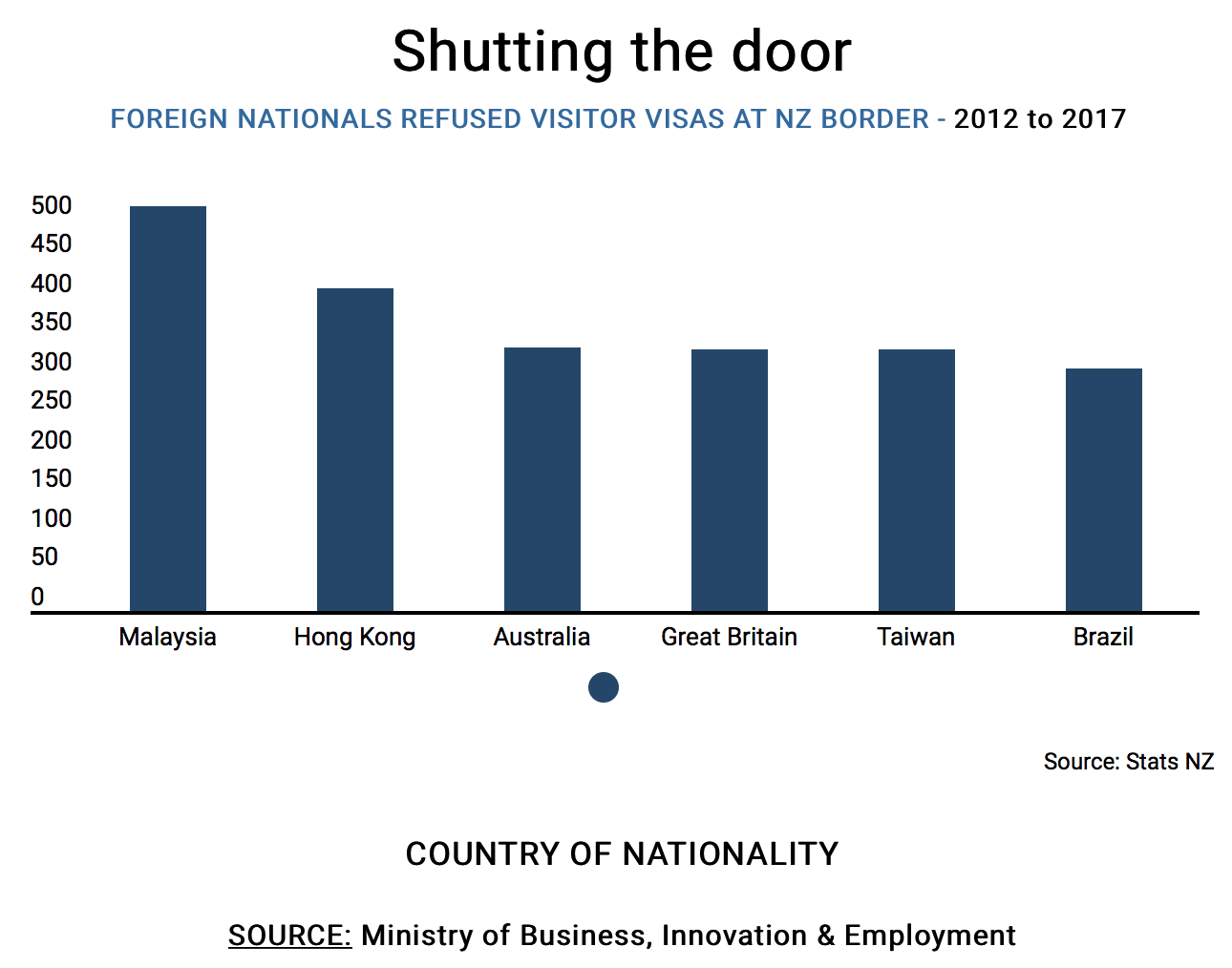
"We could attract more of them, hanging on to good ones, and some argue that any student who gets an advanced degree in New Zealand should give them a passport so those skills are kept here."
Many of the country's top companies have joined recruitment drives that search the globe, hoping to plug New Zealand's talent gap.
"Do we want to be open to the world or not? Historically we do," said Glass.
"I don't know that economics is the most important point when it comes to immigration, it's more about identity and about how see ourself."
(Source: Stuff, ANDY FYERS AND BRAD FLAHIVE)

